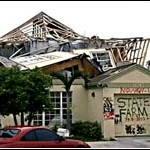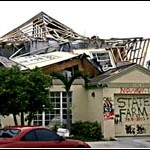 If you are an Alzheimer’s caregiver, you need to take special precautions in preparing for natural disasters such as hurricanes. We have provided some considerations, tips and resources here for Disaster Preparedness for persons with Alzheimer’s Disease.
If you are an Alzheimer’s caregiver, you need to take special precautions in preparing for natural disasters such as hurricanes. We have provided some considerations, tips and resources here for Disaster Preparedness for persons with Alzheimer’s Disease.
Read one caregiver’s account of caring for his father with Alzheimer’s during some of Florida’s stormy weather. He has great insights and ideas, and also reminds us how even seemingly minor weather patterns can be problematic for individuals with dementia and their caregivers.
For anyone diagnosed with Alzheimer’s it is recommended:
- Enroll in MedicAlert® + Alzheimer’s Association Safe Return®, a 24-hour nationwide emergency response service for individuals with dementia that wander or who have a medical emergency (information at 1.888.572.8566 or visit www.alz.org).
- If you are already enrolled in MedicAlert + Safe Return, make sure your information is up to date, especially in preparation for storm season.
- Do not leave the person alone. Even those who have not been prone to wandering off before may do so when confronted with new situations, change of environment and anxiety.
Be aware-changes in routine, traveling and new environments can cause:
- Agitation
- Wandering
- Increase in behavioral symptoms, including hallucinations, delusions and sleep disturbance.
Tips for preventing agitation:
- Do your best to remain calm, as you set the tone for your loved one.
- Provide frequent reassurance.
- Find outlets for anxious energy-engage the person in simple tasks, distract/talk about memories, etc.
- Redirect the person’s attention if he or she becomes upset.
- Move the person to a safer or quieter place, if possible. Limit stimulation. (This is one reason to consider special needs/emergency shelters an absolute last resort. A person with dementia may not do well in the crowded, chaotic environment.)
- Make sure your loved one takes medications as scheduled.
- Try to schedule regular meals and maintain a regular sleep schedule.
- Avoid elaborate details. Provide information using concrete terms and follow brief explanations with reassurance.
- Be prepared to provide additional assistance with activities of daily living. Forgetfulness, abilities, incontinence may all change.
- Pay attention to cues that the person may be overwhelmed, such as fidgeting or pacing.
- Remind the person that he or she is in the right place.
During an episode of agitation:
- Approach the person from the front and use his or her name.
- Use calm, positive statements and a patient, low-pitched voice. Reassure.
- Respond to the emotions being expressed rather than the content of the words, as the person may not be able to verbalize his/her true feelings.
- Don’t argue with the person or try to correct perceptions. Instead, affirm his or her experience, reassure and try to divert attention.
- Under no circumstances should a person with Alzheimer’s be left alone following a natural disaster. Do not count on the individual to stay in one place while you go to get help.
If you need to evacuate someone with dementia:
- Have an emergency kit prepared with items you may need. Remember the anxiety and physical situation may bring on different needs for your loved one. You may need additional incontinence products, consider what comfort items might help, and talk to your loved one’s doctor beforehand about anxiety or behavioral concerns and needs. (See our Disaster Preparedness Checklist. Make sure you bring contact information, brief medical history, extra medication and a picture of your loved one.)
- Evacuate early and be extra cautious. Being stuck in long traffic delays or feeling rushed is not good for your loved one with dementia.
- People with dementia are especially vulnerable during chaotic times. They have a limited ability to understand what is happening. Be alert to potential reactions that may result from changes in routine, traveling or new environments.
- When appropriate, inform others that your loved one has dementia and may not understand what is happening. Consider printing up some small cards that you can discretely hand to someone with a brief explanation.
For caregivers who live at a distance, consider:
- Alternative arrangements during a storm, such as bringing your loved one to stay with out-of-town relatives well before an approaching storm; respite care at a facility equipped to care for someone with Alzheimer’s disease; a professional caregiver (with proper dementia training) who can be hired to stay with the person (at home if feasible, or at an alternative safe location). Even if you are with a loved one, a professional caregiver may be a great help to you, as you try to juggle your loved one’s increased needs and dealing with preparations and cleanup after a disaster. It may be difficult to arrange a caregiver as they, of course, have to deal with their own and their family’s safety too. Talk to local home care companies about whether they can provide someone and make arrangements well in advance. (You should also introduce caregivers in non-emergency situations to give the caregiver time to become acquainted with your loved one.)
- Do not underestimate your loved one’s safety needs during even minor storms or disruptive weather. A person with cognitive deficits may be able to manage under routine, familiar circumstances but will be vulnerable in changing conditions.
- Scam artists prey on people after natural disasters and may target elders living alone.
For more information & assistance with home care needs, eldercare and senior disaster preparedness, contact us today. EasyLiving can also help shop for and prepare emergency supplies/evacuation kits.
**Thanks to the Alzheimer’s Association (www.alz.org) website, for valuable information & resources on this topic.







